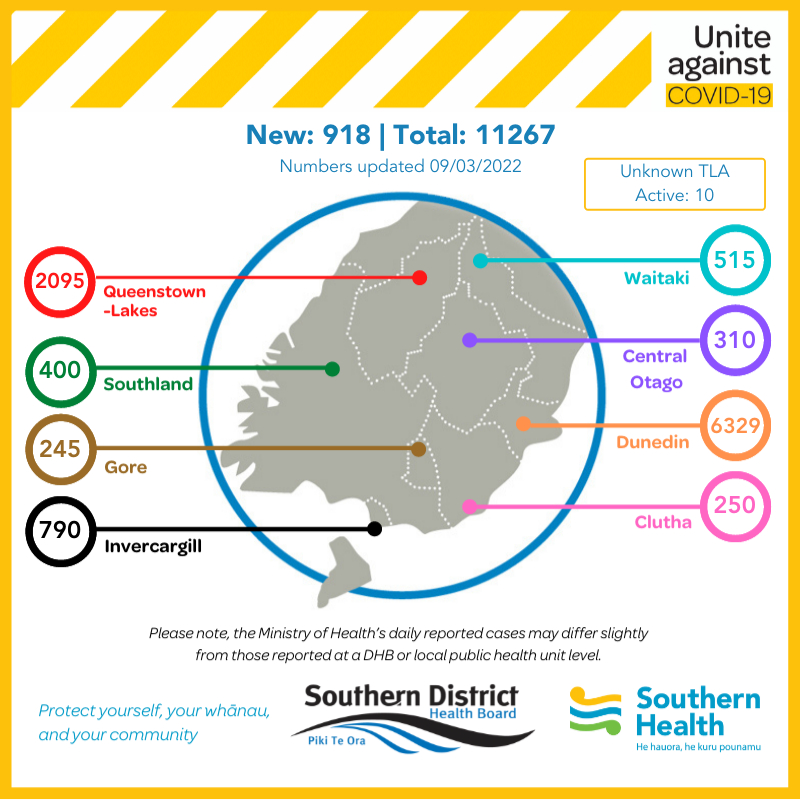
There are 13 people in southern hospitals with the virus - eight in Dunedin, two in Southland and one in Lakes, the Southern DHB reported this afternoon.
The southern numbers come as the country records 21,015 new cases today, mostly of the highly transferrable Omicron variant. There are 845 people in hospital across New Zealand, including 16 in ICU.
The previous highest daily total in the South was 914 cases, reported on Tuesday this week.
The new cases are in (PCR & RAT): Northland (689), Auckland (7,234), Waikato (2,016), Bay of Plenty (1,392), Lakes (632), Hawke’s Bay (700), MidCentral (653), Whanganui (156), Taranaki (524), Tairāwhiti (353), Wairarapa (170), Capital and Coast (1,858), Hutt Valley (1,103), Nelson Marlborough (449), Canterbury (2,021), South Canterbury (109), Southern (918), West Coast (26); Unknown (12).
There are also 15 new cases at the border today.
The Ministry of Health this evening issued a correction to hospitalisation counts released earlier today, due to data issues. This affected overall number for cases in hospital and also hospitalisation numbers for Northland, Auckland and Counties Manukau DHBs.
The correct figures are:
Cases in hospital: total number 773: Northland: 8; Auckland 158; Waitematā 154; Counties Manukau 195; Waikato: 71; BOP: 23; Lakes: 9; Tairāwhiti: 4, Hawke’s Bay: 21; Taranaki: 10; MidCentral: 17; Whanganui: 3; Hutt Valley: 17; Capital & Coast: 46; Nelson Marlborough: 4; Canterbury: 18; Timaru: 2; Southern: 13. The average age of current hospitalisations: 54

Please note, the Ministry of Health’s daily reported cases may differ slightly from those reported at a DHB or local public health unit level. This is because of different reporting cut off times and the assignment of cases between regions, for example when a case is tested outside their usual region of residence. Total numbers will always be the formal daily case tally as reported to the WHO. Due to the increased use of RATs and system lag issues there may be a discrepancy in the number of total active cases from the territorial authority breakdown.
A decision has been made nationally that areas with less than 5 new cases per 24-hour period will be reported as “<5”. All territorial authorities with less than 100 cases will have their case numbers rounded to the nearest 5. We are unable to supply further information. Please contact the Ministry of Health directly for more information about these decisions.
Visiting loved ones in aged residential care
As the Omicron outbreak spreads in the Southern district, many aged residential care facilities are having staff test positive and some are finding Covid infection amongst residents, the Southern DHB says.
All aged residential care facilities who have staff and/or residents affected by Covid have contacted family, whānau and loved ones of their respective residents to inform them of what is happening in their facilities.
Some aged residential care facilities have closed to visitors in the short term as a precaution to protect their vulnerable residents, the DHB said in a statement this afternoon.
"If you have a loved one in an aged residential care facility and are unsure if you can visit them, please phone the facility in question. All staff at these facilities are putting the care and safety of their residents at the forefront of all that they do. They will be more than happy to speak to you and advise you of any safety measures they have put in place."
People able to visit loved ones at an aged residential care facility are likely to find the following precautions in place:
- Strict enforcement of surgical-grade mask wearing at all times
- Strict enforcement of hand hygiene measures
- Physical distancing being observed
Individual care facilities may have further visiting rules in place and people should check with the facility before visiting.
"People wanting to visit loved ones are also asked not to if they are feeling unwell, have cold or flu-like symptoms, are household or close contacts of a positive case, or have tested positive themselves and are still in their isolation period."
The Southern DHB and Public Health South were continuing to support aged residential care facilities throughout the district.
Reduction in isolation period
As of 11.59 pm Friday, March 11 the isolation period for Covid-19 cases and household contacts will reduce from 10 days to 7 days.
Household contacts will need to have a rapid antigen test (Rat) on day 3 and day 7. If they become symptomatic during their 7-day isolation period, they will need an immediate RAT.
If a household contact does not get any symptoms, they will need to return a negative rapid antigen test on day 7 at the end of their 7-day isolation period.
If the household contact becomes a case, they will then start their 7 days of isolation as a case.
Where to go and who to call
Testing locations can be found on the WellSouth website.
If you have any questions about Covid-19, self-isolation, or what you need to do if you test positive, please call Healthline on 0800 358 5453
If you are self-isolating and require welfare support such as help getting groceries, please call 0800 512 337
For information specific to Covid in the Southern region and to find your nearest testing centre please call WellSouth on 0800 VIRUS19 (0800 847 8719)
If you have concerns about Covid symptoms, please call your general practice or Healthline on 0800 358 5453 at any time. If you are very unwell or having breathing difficulties, please call 111 immediately.












